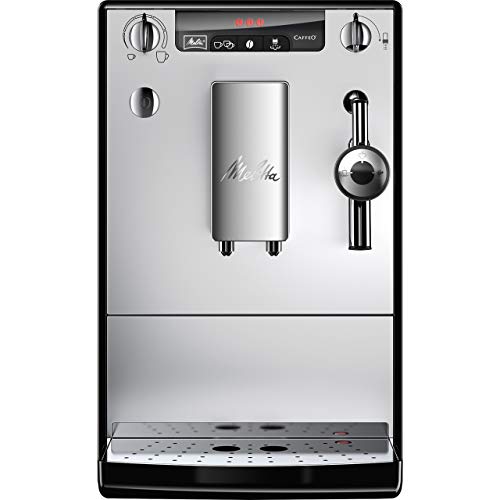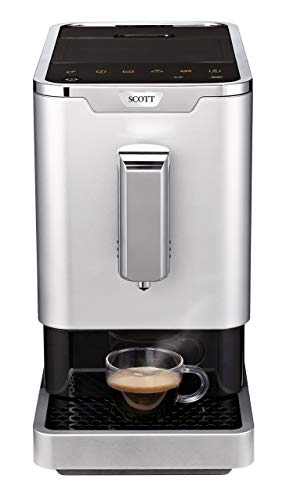7 Secrets About Coffee Bean Coffee Machine That Nobody Will Share With…
페이지 정보

본문
 Bean-to-Cup coffee machine for beans Machines
Bean-to-Cup coffee machine for beans Machines Bean-to-cup coffee machines are great for those mornings that are dreary and you simply want to hit a button for your caffeine fix. They also provide a level of flexibility for adventurous drinkers.
Bean-to-cup coffee machines are great for those mornings that are dreary and you simply want to hit a button for your caffeine fix. They also provide a level of flexibility for adventurous drinkers.They work by storing whole beans in a hopper, grinding them before brewing and dispensing drinks at the click of the button. They can serve customers and staff without the need for baristas who are trained.
Cost-effectiveness
Each type of coffee pod has pros and cons, regardless of whether you prefer the traditional flavor or convenience of pre-packaged pods. Cost-effectiveness is the most important factor. Bean-to cup machines are more affordable for long-term usage than pod-based models. They can help you avoid recurring expenses by using bulk-bought premium beans that can be purchased at a cheaper cost than coffee pods. They can also help reduce the amount of waste produced by removing coffee pods.
Bean-to-cup coffee makers are an excellent choice for office environments because they're simple to use. bean to cup espresso-to-cup coffee makers are a great alternative to manual drip-style coffee makers that require users to grind and prepare beans manually. They can make an even, smooth drink at the touch of a button. Additionally they're designed with minimal maintenance and cleaning in mind, and many have integrated cleaning and rinsing programs that make it easy to ensure they are running smoothly.
The primary advantage of a Bean to Cup machine is its simplicity of use. It is easy to set up and use and doesn't require any prior knowledge. It has a built-in milk frother as well as a grinder. This makes it perfect for small businesses with a only a few employees. Additionally, it offers high-quality coffee at the push of an button, which is particularly useful for offices with a lot of traffic.
It's more expensive to buy a bean-to cup machine than a pod-based one, but it can save you money in the long run by reducing your energy and supply costs. It is also more eco sustainable than pod-based machines as it produces less waste and consumes less resources.
Providing coffee to your employees can be an effective method to boost productivity and morale. By installing a bean to cup machine in your breakroom, you will create a setting that encourages collaboration and teamwork. Additionally, it can encourage interaction between your employees by promoting informal conversations. In these discussions employees can share their thoughts and find creative solutions to problems. Moreover, a quick cup of coffee can give your brain a boost and inspire imagination.
Convenience
Bean-to-cup coffee machines are a cost-effective method to serve premium coffee at the click of the button. They are easy-to-use and require little maintenance. They also feature built-in grinders to ensure that your beans are freshly ground for each cup. They can also be programmed to create a variety of different drinks at the touch of a button, such as cold and hot drinks. This allows you to create different drinks for your employees and customers.
A bean-to cup coffee machine will also save you money by reducing the need for plastic cups and paper filters. Additionally, it will decrease the amount of coffee grounds that ends in the landfill. If you're an eco conscious person, you could make use of a coffee maker that provides organic whole beans for a more sustainable and sustainable experience.
Unlike pod coffee machines, which require a certain amount of proficiency to operate, a bean to cup machine can be operated by anyone who has little or no knowledge. The user only needs to top off the water tank and bean hopper before selecting the beverage they want from the machine's easy-to-use control panel. Some coffee bean machines allow you to alter the strength and temperature.
While pod coffee machines use pre-ground coffee powder The bean to cup coffee machine grinds whole beans prior to making each cup of coffee. This preserves the aroma and flavour of the beans and results in a more authentic flavour and texture. They are also able to adapt each cup of coffee to its user, learning their preferences throughout the day. Barista Smart is a good example of a machine that does this. It can be programmed to handle 21 different kinds of coffee, from espresso to black coffee.
A bean-to-cup coffee machine can also run rinse cycles prior to turning off and when it is first turned on to keep the build-up of coffee residues on the spouts and milk dispenser. In addition, it has an internal bin to collect leftover coffee grounds and milk. The bin doesn't have to be emptied daily and will usually have an indication on the screen when it's full.
Freshness
Freshly brewed coffee is packed with health benefits. It can improve metabolism, lower the risk of heart disease, and provide an energy boost that is natural. It is crucial to select the right beans for your machine. Select whole bean coffees that have a a clearly marked roast date to ensure the best bean to cup coffee machine quality and taste for your cup. This is important for bean-to-cup machines which require freshly roasted ground coffee beans. Coffee beans that are stale will have bitter taste and lack flavor.
The shelf life of coffee beans is contingent on a variety of factors, including storage conditions and temperature. Unopened bags of whole beans can be kept for up to six months following roasting if they are properly stored. Once the beans are ground, their shelf life decreases dramatically due to the larger surface area that exposes them to oxygen. In general it is recommended to use freshly ground beans within two weeks of opening or grinding.
Another method to determine if your coffee is fresh is by inspecting the appearance of the beans. Fresh beans will appear shiny, whereas older coffee beans appear dull and dried. The smell of the beans can aid in determining if they are fresh or not.
When coffee beans are roasted they release volatile aromatic oils that give the flavor of the beans. These oils are the reason for the distinctive aroma of each coffee, and when they lose their potency, the flavor of the coffee that is brewed will be diminished. To avoid this, make sure you buy coffee beans that have a clear roasting date and store them in an airtight jar.
It is also recommended to grind the coffee for a few days before the brewing. This will slow down the process of oxidation and ensure that you get the fullest flavor possible. To get the best coffee beans for bean to cup machines outcomes, do not store coffee beans that have been roasted in the freezer, as this could cause structural damage and moisture accumulation.
The hopper is an essential component of any bean-to cup machine and must be cleaned regularly to get rid of any dirt and water. Cleaning the hopper can help prevent blockages and improve the overall performance of the machine. This can be accomplished by taking the hopper out of the machine every day, washing it with hot water and wiping it down with a clean cloth to remove any buildup or dust.
Sustainability
No matter if you consume your coffee in an instant cup, filter, or a single-serving capsule the most sustainable option is to purchase beans that are produced and processed sustainably. By choosing sustainable brands or buying beans that are UTZ or fair trade certified, you can reduce the amount of waste generated in the roasting and packaging processes. These certifications ensure that farmers who cultivate the beans are paid a fair wage and working conditions.
Coffee beans are the biggest source of greenhouse gas emissions. This can range from 40 to up to 80%. This is because big companies use intensive fertilizers, irrigation, and pesticides to boost the yield of their crops. This causes deforestation, contaminates water sources, and kills a variety of species. It also causes soil erosion, which causes climate change and a loss of soil.
By selecting a bean-to- cup machine it will allow you to reduce the carbon footprint of your coffee by avoiding the use of paper cups and plastic pods. You can even go one step further and share the machine with a coworker to reduce the amount of energy needed to make your morning coffee. You can also lessen the environmental impact of your coffee by purchasing an environmentally sustainable, refillable pod.
Espresso machines are more efficient now due to the increasing focus on sustainability. They make use of less electricity. Some are made from recycled materials, and some are even 100 percent compostable. This means that they will turn into a biomaterial within 84 days of disposal. You can also reduce the amount of waste added to the waste problem by encouraging your colleagues to use reusable mugs as well as tumblers, as well as by offering coffee grounds to compost. Donating to charities that support sustainable coffee production is another option to contribute. You can also reduce the environmental impact of your coffee by avoiding the use of single-use accessories such as stirrers and sweeteners.
- 이전글17 Reasons Why You Shouldn't Not Ignore Car Accident Attorney For Hire 24.11.21
- 다음글10 Car Wreck Lawyer Tricks Experts Recommend 24.11.21
댓글목록
등록된 댓글이 없습니다.